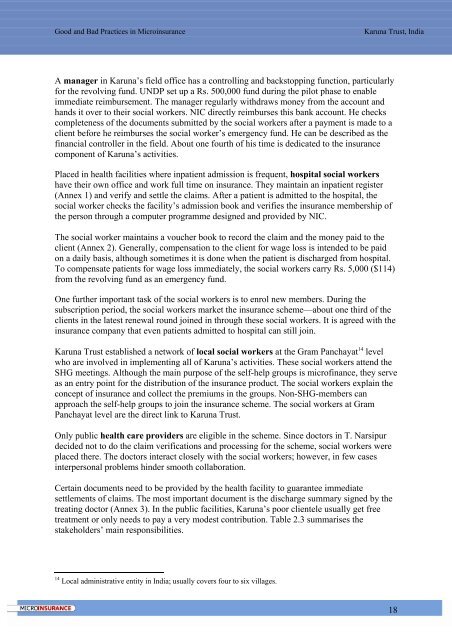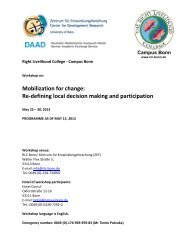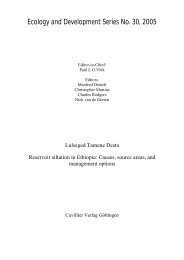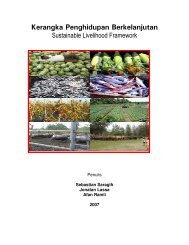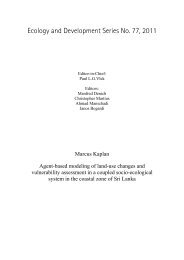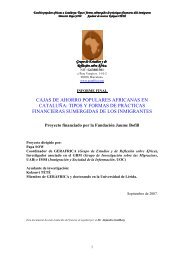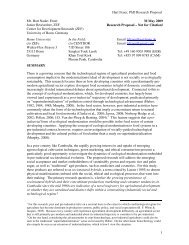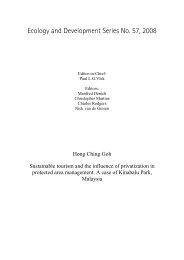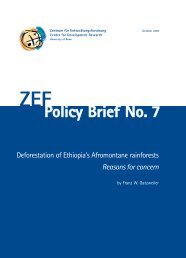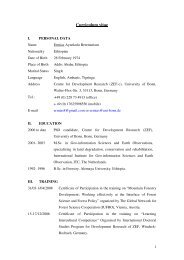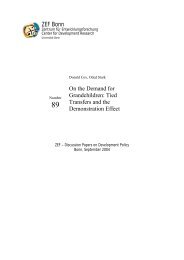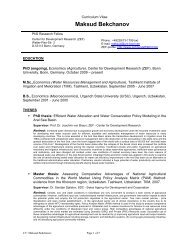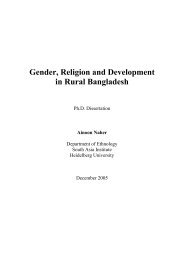Karuna Trust, Karnataka - ZEF
Karuna Trust, Karnataka - ZEF
Karuna Trust, Karnataka - ZEF
You also want an ePaper? Increase the reach of your titles
YUMPU automatically turns print PDFs into web optimized ePapers that Google loves.
Good and Bad Practices in Microinsurance<strong>Karuna</strong> <strong>Trust</strong>, IndiaA manager in <strong>Karuna</strong>’s field office has a controlling and backstopping function, particularlyfor the revolving fund. UNDP set up a Rs. 500,000 fund during the pilot phase to enableimmediate reimbursement. The manager regularly withdraws money from the account andhands it over to their social workers. NIC directly reimburses this bank account. He checkscompleteness of the documents submitted by the social workers after a payment is made to aclient before he reimburses the social worker’s emergency fund. He can be described as thefinancial controller in the field. About one fourth of his time is dedicated to the insurancecomponent of <strong>Karuna</strong>’s activities.Placed in health facilities where inpatient admission is frequent, hospital social workershave their own office and work full time on insurance. They maintain an inpatient register(Annex 1) and verify and settle the claims. After a patient is admitted to the hospital, thesocial worker checks the facility’s admission book and verifies the insurance membership ofthe person through a computer programme designed and provided by NIC.The social worker maintains a voucher book to record the claim and the money paid to theclient (Annex 2). Generally, compensation to the client for wage loss is intended to be paidon a daily basis, although sometimes it is done when the patient is discharged from hospital.To compensate patients for wage loss immediately, the social workers carry Rs. 5,000 ($114)from the revolving fund as an emergency fund.One further important task of the social workers is to enrol new members. During thesubscription period, the social workers market the insurance scheme—about one third of theclients in the latest renewal round joined in through these social workers. It is agreed with theinsurance company that even patients admitted to hospital can still join.<strong>Karuna</strong> <strong>Trust</strong> established a network of local social workers at the Gram Panchayat 14 levelwho are involved in implementing all of <strong>Karuna</strong>’s activities. These social workers attend theSHG meetings. Although the main purpose of the self-help groups is microfinance, they serveas an entry point for the distribution of the insurance product. The social workers explain theconcept of insurance and collect the premiums in the groups. Non-SHG-members canapproach the self-help groups to join the insurance scheme. The social workers at GramPanchayat level are the direct link to <strong>Karuna</strong> <strong>Trust</strong>.Only public health care providers are eligible in the scheme. Since doctors in T. Narsipurdecided not to do the claim verifications and processing for the scheme, social workers wereplaced there. The doctors interact closely with the social workers; however, in few casesinterpersonal problems hinder smooth collaboration.Certain documents need to be provided by the health facility to guarantee immediatesettlements of claims. The most important document is the discharge summary signed by thetreating doctor (Annex 3). In the public facilities, <strong>Karuna</strong>’s poor clientele usually get freetreatment or only needs to pay a very modest contribution. Table 2.3 summarises thestakeholders’ main responsibilities.14 Local administrative entity in India; usually covers four to six villages.18


